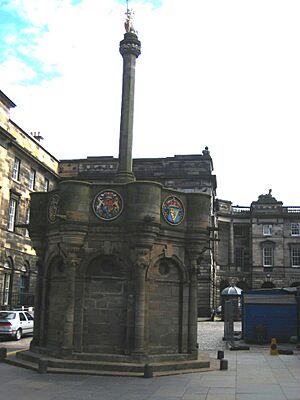Cromwell's Act of Grace facts for kids
The Cromwell's Act of Grace was a special law passed by the English Parliament. It was also known as the Act of Pardon and Grace to the People of Scotland. This law said that most people in Scotland were forgiven for anything they might have done during the Wars of the Three Kingdoms. It was announced in Edinburgh on May 5, 1654, at the Mercat Cross. General George Monck, who was the English military leader in Scotland, was there. He had arrived the day before for other important announcements. These included declaring Oliver Cromwell as the leader of England, Ireland, and Scotland, and that Scotland was now joined with England.
Contents
Why This Act Was Made
After England invaded Scotland in 1650, Scottish armies were defeated in battles like Dunbar and Worcester. This meant England took control of Scotland. General Monck became the military governor. The English army had mostly stopped Scottish resistance. This control lasted until 1660.
The idea for this Act came from England's written constitution, called the Instrument of Government, created in December 1653. Between December 1653 and September 1654, Oliver Cromwell and his government had the power to make new laws for the peace of the nations. On April 12, 1654, they passed several laws for Scotland. These included:
- A law to unite Scotland with England.
- The Act of Pardon and Grace for the Scottish people.
- Laws for setting up courts in Scotland.
- Laws for taking over the properties of certain people in Scotland.
What the Act Said
The Act of Grace had several main parts:
- A general pardon, meaning most people were forgiven.
- Exceptions for members of the royal family. Their properties were taken.
- Exceptions for other people whose properties were taken.
- Exceptions for people who had to pay fines.
- Other special rules and exceptions.
General Forgiveness
The first parts of the Act aimed to end the Wars of the Three Kingdoms. Oliver Cromwell, the leader of England, Scotland, and Ireland, declared that from May 1, 1654, most Scottish people were forgiven. They would not face more financial or other punishments for their actions during the wars.
The rest of the Act then listed who was not included in this general pardon. It also clarified some of the details.
Royal Family Exceptions
The Act said that royal properties and possessions in Scotland were taken by the English government. This included any royal properties that had been given to others since May 1, 1642.
Properties Taken from Others
The Act listed many men whose properties were taken by the English government. These properties were taken as they were on April 18, 1648. One man, James, 1st Lord Mordington, also had specific properties taken.
The Act also allowed for properties to be taken from certain Scots who had fought against the English Parliament since 1648. This included those who were still fighting after September 3, 1650. It also applied to those Oliver Cromwell did not believe were loyal to the new government. This included Scottish Members of Parliament who had not protested against the English invasion in 1648. It also covered those who were part of the Scottish Parliament or army after the Battle of Dunbar in 1650.
The Act gave a limited time for people to claim money owed to them from these taken properties. Claims had to be made within 60 days of the Act's announcement.
Some lands were given to the wives and children of those whose properties were taken. But they had to pay rent to Cromwell. They also had to give up any claims to other properties that belonged to those not pardoned.
People Who Were Fined
Many men were ordered to pay fines. The Act explained how these fines should be paid. Money was to be paid to Gilbert Bilton in Leith. Half was due by August 2, 1654, and the other half by December 2, 1654. If someone did not pay, their property could be taken by the government.
Other Rules
The final parts of the Act made sure it did not cause other legal problems. For example, the Act did not bring back any old lordships or powers that had been removed by the law uniting Scotland with England.
The general pardon also did not apply to people who had been fighting since May 1, 1652. They would still face military rules. The pardon also did not free prisoners of war or cancel their promises for release.
Finally, the Act made sure that the money that used to go to the Scottish Crown would now go to Oliver Cromwell.
When the Act Became Law
Even though the Act was announced on April 12, 1654, it did not officially become law until June 26, 1657. On that day, Oliver Cromwell approved an enabling act. This act made the Act of Pardon and Grace, and other related laws, official.
Images for kids
-
The Act of Pardon and Grace was proclaimed at the Mercat Cross on Edinburgh's Royal Mile.
See also
 | Emma Amos |
 | Edward Mitchell Bannister |
 | Larry D. Alexander |
 | Ernie Barnes |



